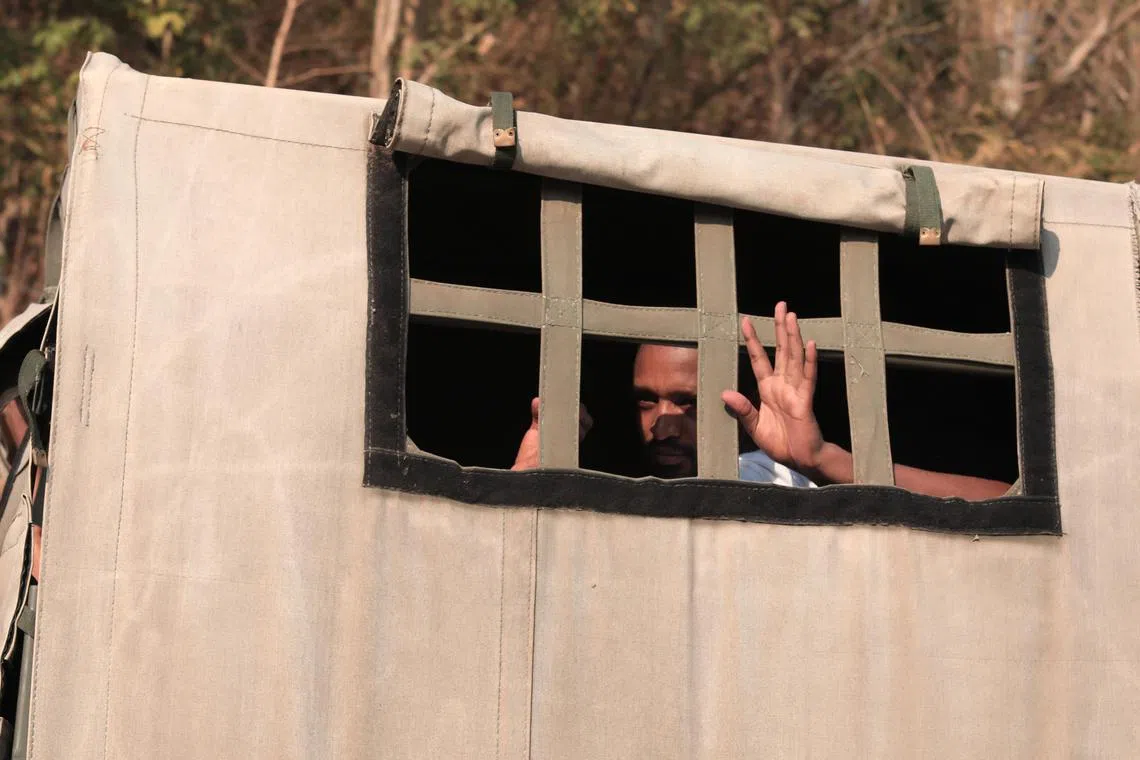Scam centre survivors tell of beatings, abuse in Myanmar
Sign up now: Get insights on Asia's fast-moving developments

A man who was rescued from a scam centre in Myanmar inside a military truck after arriving in Thailand on Feb 12.
PHOTO: EPA-EFE
Follow topic:
PHOP PHRA, Thailand – At a scam compound in Myanmar, Filipino worker Pieta had just days to romance strangers online and trick them into investing in a fake business – failing which she would be beaten or tortured with electric shocks.
Ms Pieta was one of 260 people – many visibly injured or bruised – rescued from an illicit centre
Scam compounds have mushroomed in Myanmar’s borderlands and are staffed by foreigners, sometimes trafficked and forced to work, swindling people around the world in an industry analysts say is worth billions of dollars.
Ms Pieta – a pseudonym to protect her identity – thought she was accepting a job in Thailand that paid US$1,500 (S$2,000) a month when she left the Philippines six months ago.
Instead, she was forced to work gruelling shifts for no pay at the compound in Kyauk Khet, a village in Myanmar’s Karen state, scamming people in Europe and living in constant fear of punishment.
“If we didn’t reach the target, we were beaten up... (or given) electric shocks,” she told AFP from a holding centre in Phop Phra district, about 30km south of Thailand’s Mae Sot city, after the rescuees were taken by boat across a small border river on Feb 12.
“I’m just going to cry. Oh my God. I’m so happy... that I left that place,” she said, adding that enforced squats – sometimes up to 1,000 – were also meted out as punishment.
The 260 foreign nationals – among thousands allegedly lured into the notorious cyberscam centres with promises of high-paying jobs before they are effectively held hostage – came from over a dozen countries, including Ethiopia, Brazil and Nepal.
Signs of physical abuse
AFP spoke to some of them under the condition of anonymity. Many bore signs of physical abuse, including one woman who had huge bruises on her left arm and thigh and said she had been electrocuted.
Mr Liu, one of 10 Chinese nationals rescued, described gory methods his Chinese bosses inflicted as punishment.
He told AFP that he saw one worker having his face rubbed into a metal grate on the floor until he bled to death – a claim AFP is unable to verify.
“So many were beaten to death, it was so bloody,” he said.
Scam centres have proliferated across South-east Asia in recent years, including the Philippines, where police this week rescued 34 Indonesians from a Manila compound.
Chinese supervisors there had allegedly stripped them of their passports and said they would be moved to a new site in Cambodia against their will.
Mr Gilberto Cruz of the Philippines’ Presidential Anti-Organised Crime Commission told AFP on Feb 14 that about 21,000 Chinese nationals who had worked for now-banned offshore gaming centres continued to operate smaller-scale scam operations in the country.
Thai officials said the Kyauk Khet centre is also run by Chinese nationals and first appeared on the other side of the Moei River in 2019, although it is still under construction.
None of the returnees – exhausted and overwhelmed – spoke of how they travelled, or were trafficked, into the compound.
Other victims in the past have said that after arriving in Thailand, they were whisked across the border and forced to commit online fraud.
But senior police official Thatchai Pitaneelaboot told local news outlet The Standard on Feb 14 that in many instances, victims come to work in the centres voluntarily.
Escape attempt
“The majority are aware of what to expect, although some are deceived while still in their countries of origin,” he said.
For those who come out of choice, it is unlikely they fully understand the horror awaiting them.
Mr Kokeb from Ethiopia said he and his fellow workers were forced to toil for 17 to 18 hours a day, and many had their phones confiscated to prevent escape.
Still, two other Kenyans – who said they had been forced to defraud internet users in “rich countries” such as the US – staged an escape with several others days before the handover, and were caught by a local militia.
The Democratic Karen Buddhist Army (DKBA), which controls the Kyauk Khet area, claimed responsibility for extracting the workers.
General Saw Shwe Wah, DKBA’s second commander-in-chief, said on Feb 12 he was “relieved to have safely handed them over” to the Thai authorities.
The DKBA and another Myanmar military group have said they will be releasing thousands more scam centre workers into Thailand in the coming weeks.
The returnees told how thousands were still being held in Kyauk Khet, but they are overjoyed to finally be returning home.
Mr Liu left his wife in his home town in Yunnan province when she was pregnant with his second child.
“I can’t wait to see my children,” he said. AFP

